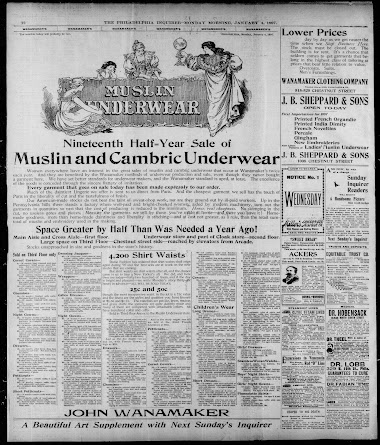by Kimberly Keagan
When we think of the Gilded Age, names like Rockefeller, Carnegie, and Vanderbilt often rise to the surface—powerful men who reshaped industries, amassed fortunes, and left legacies chiseled into stone and steel. But there was another name, quietly making history not just with innovation, but with integrity. His store became a household word, but his deeper legacy was one of faith, generosity, and an unwavering belief that business could be sacred work.
When we think of the Gilded Age, names like Rockefeller, Carnegie, and Vanderbilt often rise to the surface—powerful men who reshaped industries, amassed fortunes, and left legacies chiseled into stone and steel. But there was another name, quietly making history not just with innovation, but with integrity. His store became a household word, but his deeper legacy was one of faith, generosity, and an unwavering belief that business could be sacred work.
John Wanamaker was born in 1838 in Philadelphia and orphaned by the age of fifteen. He got his start in retail as a clothier’s apprentice, but even from the beginning, he approached business differently. In 1861, he opened a men’s clothing store with his brother-in-law and called it Oak Hall. That modest venture laid the foundation for something revolutionary: a new kind of department store, one built on fixed prices, customer service, and Christian principles.
Long before the term "corporate culture" was coined, Wanamaker was shaping one that centered on respect, morality, and service. He is widely credited with inventing the price tag, abolishing the era’s norm of haggling, which often favored the wealthy and well-connected. He insisted that every customer be treated fairly, whether a society matron or a shopgirl, and that his advertisements be honest, never manipulative.
A 3/4 page Wanamaker ad in the Philadelphia Inquirer, 1897
In 1876, he took a bold step and purchased an abandoned railroad depot to create Wanamaker’s Grand Depot. There, he introduced fixed pricing, money-back guarantees, and open browsing—concepts that were groundbreaking at the time. He added innovations like electric lighting, in-store restaurants, elevators, and eventually, the world’s largest pipe organ. Yet for all the modern marvels, it was the unseen values that held the store together.
Top photo: the outside of the Wanamaker Grand Depot store
Bottom photo: a rare photo circa 1890 (author's collection) of
the inside of the Grand Depot store
Wanamaker never hid his faith. In fact, it permeated everything he did. He closed his stores on Sundays. He held worship services for employees in an in-store chapel. He hired a chaplain. At Christmas, he gave every employee a Bible; thousands each year. He believed his calling wasn’t just to run a business, but to serve people. “A store,” he once said, “is a public trust.”
Employees were expected to maintain high moral standards, and leadership had to sign pledges of personal integrity. Wanamaker's advertisements frequently included Scripture, and during the Christmas season, his stores celebrated not just festivity—but faith. And while the grand organ played on the sales floor, Scripture cards were quietly tucked into shopping bags.
In 1889, his reputation for honest leadership earned him a post in President Benjamin Harrison’s cabinet as Postmaster General. He brought the same values to government service—fighting corruption, expanding rural delivery, and standardizing postage in ways that modernized the postal system. Yet even in Washington, his heart remained with his store—and the people it served.
John Wanamaker died in 1922, but his legacy lingered. His name remained emblazoned on his stores for decades, and his values left a mark on American retail. While society valued wealth and spectacle, Wanamaker quietly modeled servant leadership. He believed that faith didn’t need to be left at the church door or the family table, but that it should guide your steps in business, in public service, and even in how you treat a stranger across the counter.
In a gilded age of towering egos and unchecked ambition, Wanamaker offered something far rarer: humility, vision, and a store built on enduring values. He didn’t just change how Americans shopped, he reminded them that character still counted.
Kimberly Keagan is a former corporate financial writer (not very romantic) who now crafts historical romances filled with strong heroines, swoon-worthy heroes, faith, and a touch of humor. Her Gilded Age romance, Perfect, is her debut novel.
Perfect
Hearts on Display Book One
When the perfect life unravels, can love turn the page to a new beginning?








I admired John Wannamaker when I first read about him years ago. Thank you for sharing some details I don't recall.
ReplyDeleteYou're welcome and thanks for reading! Such an interesting man, wasn't he?
DeleteThank you for posting about this man. I love how his faith permeated his whole life!
ReplyDeleteI have several books about him and I love how he defies how we think of wealthy men of that era!
ReplyDeleteMy maternal ancestors came to the US in mid-1880s from Great Britain. My Great Grandfather and Great Uncle both began working at Wanamakers as Master Goldsmith and Master Watchmaker in Philly. My family went often from our home in Bethesda MD (Metro DC). I have followed that Holiday tradition as often as possible since that time, as I am still in the general area of MD. I was sad when Macy's bought the store, and even more sad with the recent sale. BUT I am so excited about the 2025 Christmas Celebration there (Nov 29–Dec 24 2025) and look forward to visiting. MEET YOU AT THE EAGLE!
ReplyDelete